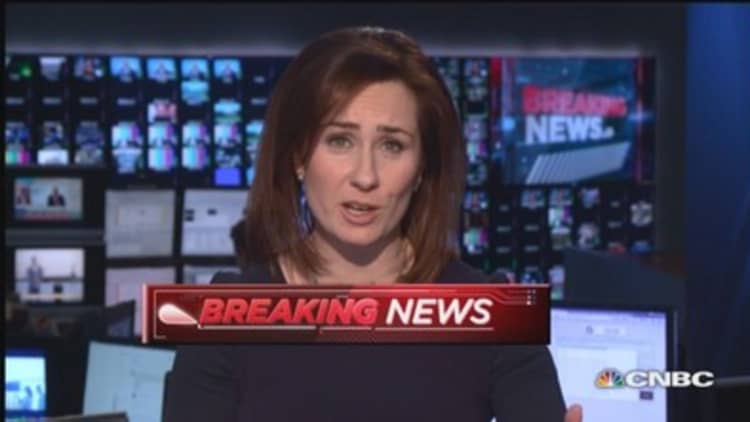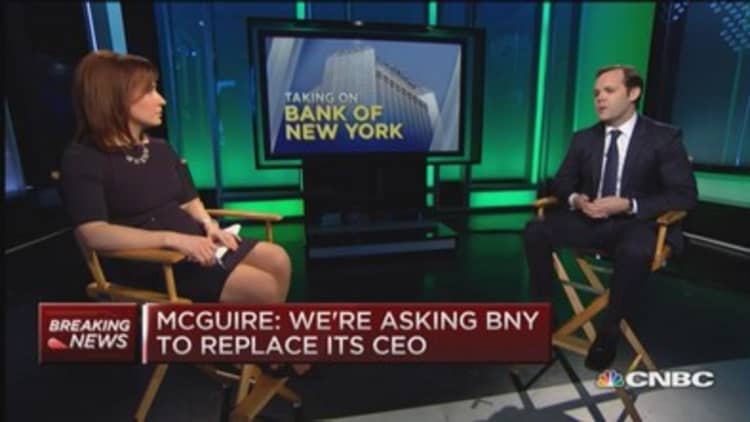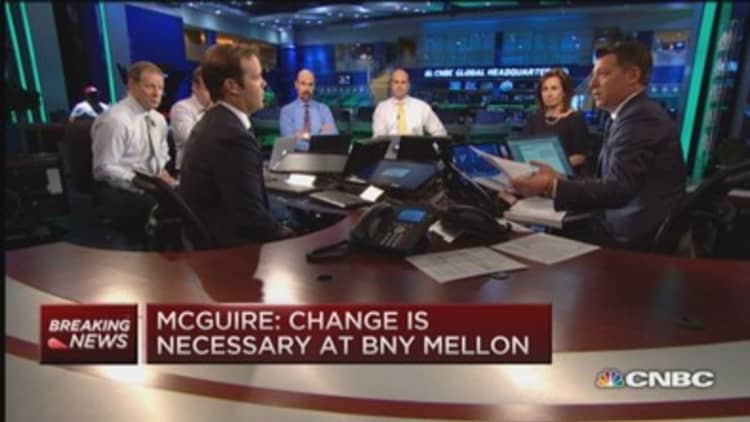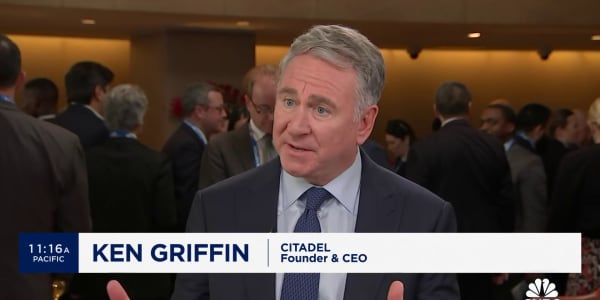


The activist investor Marcato Capital Management on Tuesday demanded the replacement of the CEO of Bank of New York Mellon, Gerald Hassell, as part of what it argued was a much-needed, wholesale reconsideration of BNY's operations, priorities and brand management.
The current leadership at BNY, wrote Marcato founder Mick McGuire in a March 10 letter to the bank's lead director, "does not recognize the magnitude of inefficiency at the company or the opportunities to drive growth and has little appetite to take the necessary actions to ignite real change."
Given the current management team's long-average tenure at BNY, McGuire added, "We doubt that meaningful progress will be achieved without new executive talent." Earlier in the letter, he noted that such change "starts with the CEO."
A spokesman for BNY defended Hassell.
"We welcome input from all of our shareholders," said a Bank of New York spokesman in response to Marcato's demands for a new CEO. "Under Gerald Hassell's leadership, BNY Mellon has continued to increase shareholder value, reduce costs, improve margins and streamline the organization, which our results clearly demonstrate."
Shares were down about 1.4 percent Tuesday but briefly hit their intraday high during a CNBC report on the dispute.
But despite McGuire's critique, the markets seem to be impressed with BNY, whose stock has doubled since the day Hassell took over, from a bit more than $20 in September 2011 to about $39 Tuesday. And even though Hassell has been a BNY employee for more than four decades, his tenure as CEO has been relatively short. The stock has outperformed the Standard & Poor's financials index of late, and has made some progress in trimming expenses.
"We respect [Bank of New York's] expense control and believe it will be well-positioned when rates do eventually rise," said Evercore ISI asset-management analyst Glenn Schorr in a recent note to investors.
McGuire and his team at Marcato, which is the bank's 13th-largest institutional shareholder with about 18 million shares, sees a multitude of management missteps at the company in recent years—many of those are listed in a 118-page presentation that accompanied Tuesday's letter to von Schack and made public on a website that was set to go public at midday Tuesday, www.abetterbankofnewyork.com.
Earnings per share—which of late have been in the mid-$2 range annualized—have been stagnant for several years, Marcato's research asserts, and BNY has fallen well short of its self-imposed 10 percent return on equity target, with ROE actually slipping year over year since 2011.
Comparable stocks, notably State Street and similar businesses within JPMorgan Chase, have outperformed BNY substantially, Marcato noted.
Though Tuesday's demands mark the most recent public activist attack on BNY, which was founded by the U.S.'s first treasury secretary, Alexander Hamilton, in 1784 and now acts as the custodian of some $28.5 trillion in assets, the company has been under pressure from other quarters, too.
During the course of the past year, some analysts have cracked down on BNY for failing to spin off certain assets or to reap greater benefits from its merger with the smaller player Mellon Financial in 2007. And last June, the hedge fund Trian Fund Management, whose principles are known for their sharp rebukes of corporate management teams, disclosed a $1 billion stake in BNY (with about 2.7 percent of the shares outstanding, Trian, which has added slightly to its position since then, is now the seventh-largest shareholder).
But unlike Marcato on Tuesday, Trian has kept its concerns about BNY largely in the private sphere so far, reportedly suggesting cost-cutting and other measures to the custodial bank in closed conversations. Even so, BNY in December named Trian co-founder Ed Garden to its board, employing what is widely regarded as a classic move to assuage a frustrated activist shareholder.
"When Trian goes on a board, our goal is always to work collaboratively with management and we have a strong track record of results," Garden said in a statement to CNBC. "I have been on the BNY Mellon Board for about three months. I am encouraged by the board's reaction to our ideas and management's sense of urgency in achieving significant operating improvement."
Marcato, the San Francisco hedge fund founded in 2010 by Pershing Square alumnus McGuire, has been a low-profile but successful investor in recent years. Managing some $3 billion, including a cornerstone investment from the hedge fund unit within the Blackstone Group, Marcato has generated double-digit returns every year since its inception except for 2014, when it returned 5.3 percent.
For February alone, Marcato returned nearly 9 percent—offsetting losses in January to be up about 2.4 percent year to date.
The hedge fund's holdings, which consist mostly of long-term equity positions, include just 13 different names, of which BNY is the largest. Other top positions include the auto-supply company Lear and InterContinental Hotels Group, both of which Marcato has been active with; the auction house Sotheby's, its eigth-biggest position, has also been a recent target.
Marcato's lengthy presentation on BNY doesn't spare any executive feelings in its analysis.
Sections entitled "Poor Management through a Changing Cycle" and "Gerald Hassell's 2011 Investor Day Targets Have Failed to Materialize," detail the ways in which the activist fund believes the company has proved a disappointing investment. They include a cumbersome cost structure thanks to too many mergers and acquisitions, including, most notably, the 2007 Mellon deal; a ballooning headcount; deteriorating return on equity figures despite a stated goal of 10 percent by the year 2014; flat earnings per share numbers in recent years; and weakening profit margins.
And Marcato's BNY presentation is notable for its scope as well as its tough tone.
In addition to scouring the public record for flaws and inconsistencies in the bank's financials and oversight, the hedge fund canvassed the financial industry for potential replacements for Hassell and even consulted with a brand manager on ideas for reshaping BNY's logo and advertising efforts. The result: a spiffed-up, multicolored version of BNY's iconic arrow-shaped logo that could be used in outdoor campaigns as a sculpture as well as on paper alongside the slogan "We're Here."
—CNBC's Scott Wapner contributed to this report.






